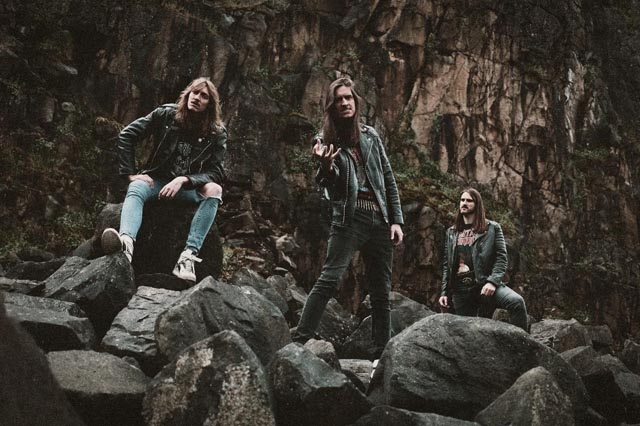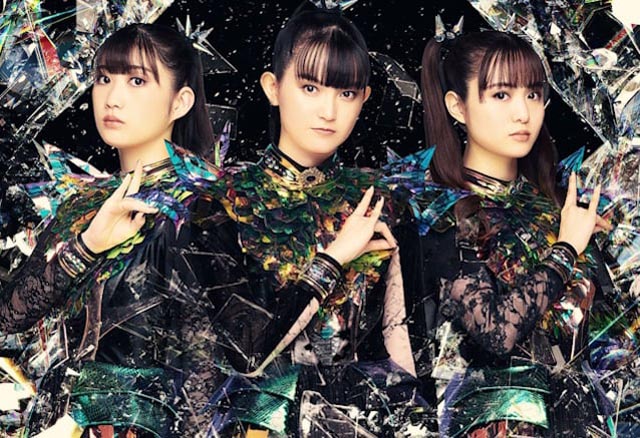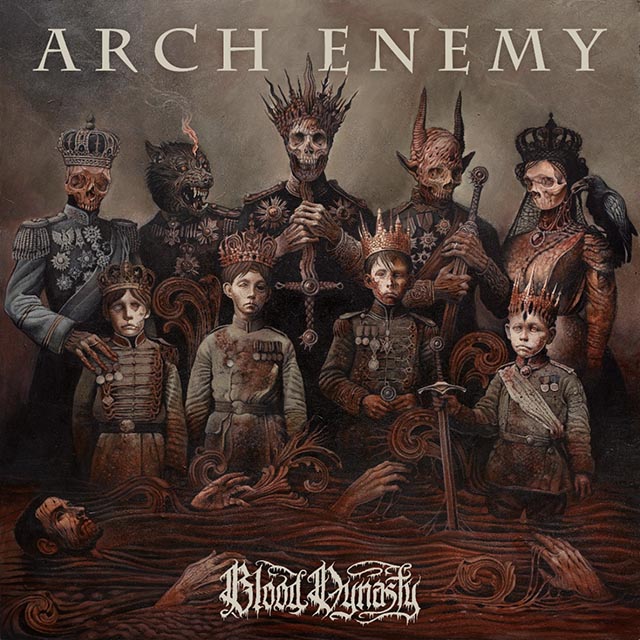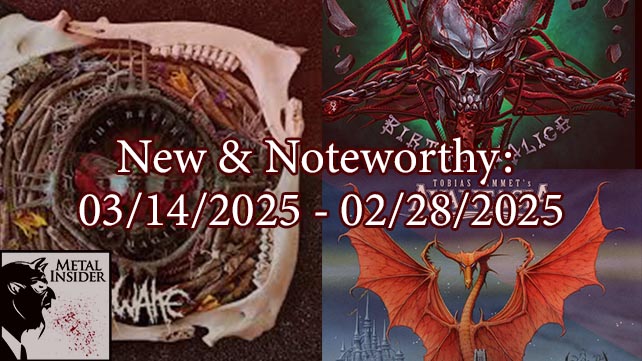 Sal Abruscato is best known for his work as a drummer with Type O Negative and Life Of Agony. Soon, though, the world will get to hear his new brainchild A Pale Horse Named Death, in which he stepped out from behind the kit to perform all the vocals and instruments for. The project’s debut album And Hell Will Follow Me will come out in the U.S. on June 14. However, we at Metal Insider are proud to be giving you a first listen when we stream the entire album this Thursday.
Sal Abruscato is best known for his work as a drummer with Type O Negative and Life Of Agony. Soon, though, the world will get to hear his new brainchild A Pale Horse Named Death, in which he stepped out from behind the kit to perform all the vocals and instruments for. The project’s debut album And Hell Will Follow Me will come out in the U.S. on June 14. However, we at Metal Insider are proud to be giving you a first listen when we stream the entire album this Thursday.
In the meantime, Metal Insider caught up with Abruscato to talk about everything regarding A Pale Horse Named Death. We discussed the project’s birth, how his experience with Type O Negative and Life Of Agony helped him shape his goals for the band, and the effect that Peter Steele’s death had on him.
How did A Pale Horse Named Death come about?
It started as a seed in my mind in January of 2009. I was watching Revelations on the History Channel, actually. They were talking about Revelations and the Four Horsemen, and Death rides a pale horse and hell followed him, and I started fooling around with the name in my head. I came up with this play on words with a pale horse named death. I was growing frustrated musically with my surroundings. I was getting tired of being in a room with a bunch of guys and no one agrees on anything. No vision, no follow through with any vision. I had all this stuff going on in my head and I just wanted to do it my way. And I knew it was either because I was crazy or I was really on to something, and I really had to get it out of my system. And that’s kind of how it began. I started writing material and recording it, and then at the same time I started going through a divorce, and that added fuel to the fire and added a lot of angst and all that stuff. I was just writing throughout 2009 into November, when we started recording the album. We took our sweet time with the recording process. We didn’t finish until June of 2010, and in the middle of all that, working on the album, you know my friend Peter [Steele] passes away, and that fueled the finale of the record.
I’m sure yesterday was kind of a bittersweet day for you. [Editor’s note: this interview took place the day after the one year anniversary of Peter Steele’s death].
Yeah, but I kind of celebrated in a way- you know Peter loved the outdoors, and he loved working for the parks department back in the day and he loved nature. And that’s what I did yesterday, I worked on my property. He loved raking leaves, that was one his favorite things, actually. And that’s what I was doing, I was raking leaves, I was turning soil over, I was just by myself getting in with the earth, thinking about him and all the things that are green, popping up out of the ground. I live in upstate New York, so there’s plenty of property to tend to. So I did that thinking of him the whole time. So I was looking at the trees, the whole green thing, and I thought there was no better way to think about thim.
As a long time Type O Negative fan, and someone that lost my dad the same day Peter died, it was a rough day for sure. But anyway, going on with A Pale Horse Named Death, was the album written when that happened?
All the material was done and I was in the middle of doing vocals when he passed away. I think we were only like two songs in vocally. So then when I went on to continue them, I prayed to him, saying ‘I could use your guidance today,’ you know that kind of stuff because vocals are hard work, and I think it added something to the finale of doing the vocals. There’s a couple more insane moments going on on that record, and even more heart, feeling and emotion in some songs. At the same time, doing vocals and grieving, and spending that week at the wake and at the cemetary, and seeing him off. It just added more emotion to the record.
So did you write the entire album, or did you write it with people?
I wrote the whole record. I played all the instruments on the record too. Matt Brown, who’s basically my partner, he’s been my producing and engineering partner, he did some solos. There were some parts where he kind of candy-coated some stuff, but even a lot of the melodic guitar work and all that stuff was done in pre-production all on my own. I had all the templates basically there. It was a plan that went into effect. I ended up doing all the rhythm guitars, all the drum work, all the bass guitars, and then the vocals. Back then I was so fed up with dealing with all the musicians and objections and interference. I said, “I’m going Trent on this record.” I’ve done so many albums working with a band, dealing with all the people’s bullshit, and I said “I’m doing things my way or the highway.” That was pretty much my approach. I had this vision to get out, I have this concept I want to get out.
Sometimes when you’re collaborating with people, you start accepting things to avoid animosity or a bad feeling. I didn’t want to deal with that Mickey Mouse stuff anymore. It’s pretty much going to stay that way where I may have all the musicians that are in the live band play parts. But as far as writing the music, I write 99% of the song and then I send it to Matt, and sometimes he’ll change one note, or he may say “let me add a thing over here” and I’m like, ‘okay, go ahead.’ That’s about the furthest it goes, as far as letting anyone be involved. It was a challenge that I wanted to see through myself. And I figured if it came out awesome. If it came out like shit, well, I tried something pretty hard to do that most people, even musicians, don’t do. It was like a musical challenge. I’ve been playing drums for 30 years, I’m getting bored. I’ve been playing guitar for a long time on my own in the privacy of my own home, but I’ve always wanted to switch it up a bit, try something new and challenge myself. It was a pretty ballsy move, a lot of people told me. I thought “if I don’t do it, I won’t find out.”
How much songwriting did you contribute to in Type O and Life of Agony?
Well Life of Agony I wrote music here or there for them. I wrote one song on the last record, a song called “Junk Sick” that I did with Keith. Again, with not being disappointed with getting the vision out, I wouldn’t even turn stuff in. The situation in Type O was more like what I modeled this after. Peter pretty much wrote all the music, and he would play it for you, and he would allow me to write my drums. Sometimes I’d have to argue with him, but I’d get the freedom to write the most appropriate beats and stuff like that. As far as musical writing, musical modes, none of us really had anything to do with that. The only person who came close to that here and there was maybe Josh. But Peter, he would walk in with everyone’s parts done, what the guitar was doing, what the keyboards were doing, what he’s doing, how fast or slow he wanted it. And at times he would kind of be like a dictator about it, but I’ll tell you one thing, I learned how to play guitar and bass because of that guy, and I also learned how to compose music and tune my ear because of that guy. I did nothing but analyze him.
I started at a very young age. I knew him from when I was 14, when I was hanging out with them when they were Carnivore. When I was 14, I was taking lessons from Louie [Beato] , the drummer. As far back as then, I thought this guy was a monster musician. He was theoretically trained also. It was very informative and a learning experience a lot of times, just to sit there and watch him do shit. It would be mind-blowing. He would tell you the key signature of anything, and working with him made me a better drummer. But he’s one of my biggest influences when it comes to the current state that I’m in mentally as a musician. Writing and orchestrating and blending 5 or 6 different melodies at once to make it in to this big thing, it was all influenced by him.
Is that going to be the motive in A Pale Horse Named Death? Are you going to welcome any outside collaboration, or are you just going to say, “here’s a song, play it like I’m telling you right now” ?
Well, Life of Agony was more collaborative. I learned from the two sides what works a lot of times, and I really believe that a melody, a vocal melody really should be born simultaneously as the music is coming out. Sometimes when you have people collaborating, it’s not coming from the same source, so it may not always work for everybody. I think I’m gonna ride my formula as far as I can. I’m going to want to create at least 95% of it, and then if someone wants to add something in, like Bobby Hambel, he did 3 leads on the record and I just let him go. I didn’t tell him what to play. I was like, “dude, just drop it like you feel it.” and that’s what we did, and we caught electrifying performances from him. So I do believe in letting people go and ride it out, what comes out of them naturally because you can’t tell them every nickel and dime. People get thrown back and stifled, they get all stuck and suddenly you can’t produce anything out of them. Same thing with Matt, we had to wrap up a bonus song for the LP version coming out. I was like “This section here needs a guitar lead. Just go for it. Do something that you feel. Do something crazy.” Because I live far away from him, we do a lot of FTP stuff, sending files back and forth. And if something fits, I’m not going to be stupid or egotistical where it’s like “We can’t have it because you came up with it.”
It’s not like that because at the end of the day, I still share royalties and things like that. It’s just about keeping the vision intact. Like I already have some stuff pre-produced for the next album. This whole mode that’s going on in the first record is going to continue, and get further twisted. Like a giant movie, just continuing. I learned a few lessons in the past about when bands put out one album one way, and then they decide to be experimental and try this whole other fucking style on their next record and that’s when bands tank a lot of times. I can’t think of any off the top of my head but I think only one or two could succeed doing that crazy idea. I guess if all the fans jump on board and they like your sound, you gotta retain it. You can’t just be flipping the burger and all of a sudden give kids a total different mode, like you just went softer or you went poppier. You gotta keep some kind of consistency going. That’s what’s gonna keep them coming back.
Well, you’ve proven that you can play guitar and play bass, would you ever do it live?
Well I play guitar live. I play guitar and I sing, and I basically add in. There’s some parts with a few different guitar melodies playing. There’s three guitars and there’s times where we can’t do everything. For instance, Matt might be doing the melodic part, I might do the root, and Bobby might have a solo. There’s a little more versatility. The cool thing is when we all hit one note, it just sounds so massive. Four stringed instruments up front playing one note is just like, “woah.” And that’s what happened at our first show. People were like “Oh, your sound is crazy! When you guys played all together it sounded enormous!” So it’s kind of cool. I add some extra depth, but I don’t play throughout the song all the time, I’ll play in a chorus or verse, different parts.
What’s your live schedule going to be like? Just shows here and there, or would you jump on a tour?
Well we’re going on tour in August, we’re going to Europe for three weeks. We’re doing a festival tour and some one-off dates. We’re going to do a co-headline thing with Seventh Void on the off dates. We’re going to be doing these pretty big European festivals, which is a great jump start to playing for a lot of people at once in a short period of time. And I know the record’s coming out June 14th I believe in the States, and a couple days later in Europe. I’m assuming that what pops up later, we’ll look at what kind of offers come in and decide what we want to pursue. We’re definitely going to tour, and support the record. I’d love to do something on a larger scale in the States, with a bigger band and get a great opening spot. To me, that’d be great versus doing something really tiny and schlepping around like a putz. So there’s gonna be touring. It might be a little selective. I just want to play my cards after being in this business for so long. I just want to hold out for the bigger and better tours and hopefully they roll in.
As far as I know, this is SPV’s priority and they see some big things in it. I’m pretty surprised. I’m very excited about it because I haven’t been involved with a label this excited in a long time. It seems like they’re really behind it. I think everything’s going to follow suit. Supply and demand- a record comes out at a good pace, has a decent reaction, and so far from what people are telling me, it’s positive across the board. We’ll take a gamble. You never know, we might have to tour all year because the record is huge.
I think you’d be okay with that though, right?
Oh yeah. You know what’s my only concern? I love rock and roll, but I do have somewhat of a life also. I have a home and I have a daughter now, and those things come into mind too. I just want to make sure they’re okay when I go. I just want to make sure everything’s covered and I’m okay. Food on the table, bills paid, and everything’s okay. And I’ll miss them dearly, but at the same time it’s an investment. Not a lot of people get another chance. I think I’ve had a bunch of chances, actually. Type O, Life of Agony, and now to be reborn as a whole new identity, and go out there and win totally new fans that may not have much to do with the other two bands and at the same time win those fans over as well. It’s exciting, and I consider in this day and age, the way the business is, it’s harder than ever to succeed and to get even a decent label to put it out for you. Everyone’s doing it themselves these days because labels don’t give the money away like they used to because things are different now. It’s hard to get a label to invest x amount of dollars to push this record to a certain level.
That’s actually what I was going to ask. Did you consider going it alone or were you actively seeking a label? Did SPV come to you?
Basically we had a few in line that we wanted to shop, and get something going. And before SPV even came into the picture we were approached by Napalm Records. So we went back and forth, but it was just not the right place for us to end up. And in the meantime, the agent was like, “let’s talk to SPV, I have a feeling they’d be really into this.” This began in the fall, and one thing led to another and finally they came, end of February and I started to see things in writing. We signed with them in March. I’m glad that we made this move. I had invested the money and I had all the artwork done. Everything was pretty much self contained, just send over the files on the template, ready to go. I handed them this awesome layout where every song has its own artwork. A lot of bands don’t go all out anymore, and it was more of a conceptual level. I don’t know if you’ve seen it, but the whole layout of the artwork from song to song, there’s a memoriam in there to Peter, a whole panel to Peter himself. It’s just beautiful, it’s real conceptual and ties everything together visually along with the music. It’s like the old days, when you bought a Floyd record and it would just suck you in, you’d read the lyrics along with the song, and look at the pictures and envision stuff.
Do you have any thoughts on where you come from? I mean you were in two of the most iconic ’90s New York metal bands. What might you bring from that into a Pale Horse Named Death?
Everything I’ve ever learned. The things not to do and the things to do. All the years of dedication and good work ethic. I like keeping a tight ship, and I make everyone run with me. It’s not unprofessional in anyway. People aren’t screwing off and coming in with hangovers. I think the knowledge of all the records I’ve done, sitting there watching producers work and people like Josh and Peter work. My experience with timing, time signatures, and music theory that I’ve learned from being in Type O. Like I said, I learned a lot of do’s and don’t’s. and that’s what it’s about. Experience, how I’m approaching it is different from how a 20 year old would approach a band now. When you’re young, you’re looking at it as good times, drugs, liquor, girls, the party mentality that actually takes over the productive mentality of getting things done. Because this is a business at the end of the day and you gotta run it like a business. I learned a lot from all those experiences, the business side of it.
Make sure to come back to Metal Insider on Thursday when we’ll be streaming A Pale Horse Named Death’s debut album And Hell Will Follow Me in its entirety.





